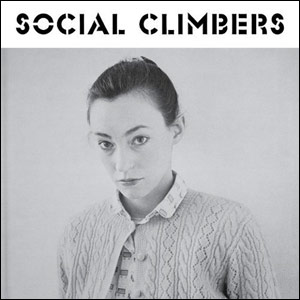
Social Climbers
Drag City
There’s obviously a reason that it has taken Social Climbers more than 30 years to finally get their due. For one, in listening to their eponymous 1981 debut (consequently their only known recordings), they sound as if they were more influenced by the denizens in the New York no wave scene rather than contributing anything defining to it. The trio, led by Mark Bingham and flanked by Jean Seton Sham and A. Leroy, was absolutely post-punk and no wave in form and function—see blunt basslines, brittle guitars tuned out of focus, stream-of-consciousness vocal chatter—but offered up a slight variation within what was usually a dissonant and nihilistic circle of bands. Social Climbers’ penchant for extant melody, auto-piloted drum-machine rhythms and virtuoso synths was likely an anomaly when pitted against the coiled tension of, say, The Contortions. Therefore, when the archeologists started to dredge up the remains from that era, this record was left in the fray. For much of the album, the band appears to be linked closer to a composer like Brian Eno (were he making a tropical dance record) than to the deconstructions of DNA or Teenage Jesus, who, ironically, were foisted upon the world by Eno himself.
Still, there’s no doubting the time and place in which the Social Climbers were created. Between Bingham’s half-spoken, half-sung delivery and the blunt minimalism at the trio’s core, they play up the terse and anxious aesthetics of no wave almost to a fault, which is a shame because the best parts here show a band that could’ve been wildly inventive given a wider palette. But perhaps that was the point: to try their damnedest to blossom under pressure and precise parameters. Whatever the case, there are eureka moments of discovery among the Social Climbers’ scant recorded output. Most noticeable, but also the most obvious, is “Chicken 80,” which starts exactly as one would expect, with a jagged, yet funky, velocity, before surprisingly awakening in a shouted, almost hopeful, anthem of a chorus. Though much of the record is by-the-numbers, it always sounds at odds with various flecks of worldly influence, be it the bubbling reggae of “Chris and Debbie” or the jazz-fusion ascensions in “Palm Springs.” For that, Bingham’s experiments are given a pass. By personal preference, I’ve always found the no wave diaspora to be repetitive and chromatic and numbingly dull. Though the Social Climbers seem to be tethered to that “revolution,” the trio also seems to share my sentiment. You can hear it deep within the electronic melt of “Western World,” when Bingham longs to get away from it all and shed his shell for some European chic or soul-searching blues down Memphis way. Sure he sounds bored, but his imagination runs rampant. That grapple is the absolute sum of Social Climbers—some winners, some losers—but at least they had fun doing it.
Kevin J. Elliott
PAST PERFECTS
Superchunk, Foolish
The George-Edwards Group, Archives
Scrawl, Velvet Hammer
Patti Smith, Outside Society
Bobb Trimble, Crippled Dog Band
Iggy Pop, Roadkill Rising... The Bootleg Collection 1977-2009
Archers of Loaf, Icky Mettle
Culture, Two Sevens Clash
The 3Ds, Early Recordings 1989-90
Stone Coal White, Stone Coal White
Father's Children, Who's Gonna Save the World
Paul McCartney, McCartney and McCartney II
Peter Tosh, Legalize It and Equal Rights
Sebadoh, Bakesale
